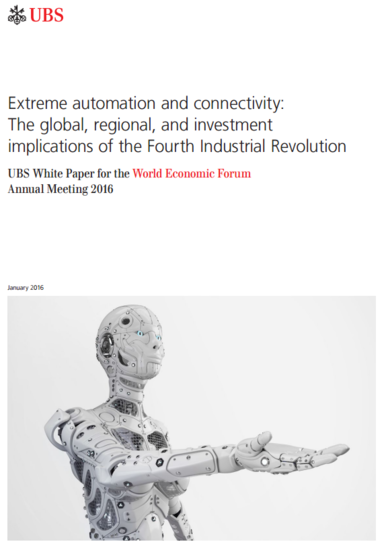hankyoreh
Links to other country sites 다른 나라 사이트 링크
South Korea is underprepared for Fourth Industrial Revolution

South Korea is underprepared at a national level for the “Fourth Industrial Revolution,” a new study suggests.
The Hyundai Research Institute (HRI) published a report on Aug. 15 titled “The Arrival of the Fourth Industrial Revolution and Its Implications.” In it, South Korea was listed as ranking just 25th in the Swiss investment bank UBS’s rating of the countries most capable of adapting to the Fourth Industrial Revolution, from a white paper released during the World Economic Forum.
Top-ranked countries included Switzerland in first place, the US in fifth, Japan in 12th, and Germany in 13th. China came in 28th. Rankings considered five categories: labor structure flexibility, skill level, educational and adaptive skill, infrastructure suitability, and legal protections.
The term “Fourth Industrial Revolution” refers to an age of technological revolution rooted in the IT-centered Third Industrial Revolution, where boundaries between fields like digital technology, biology, and physics dissolve and mutual convergence is achieved. An example may be the combination of 3D printing with genetic engineering technology to develop printing methods for body tissues.
Based on an analysis of listed companies in South Korea, Germany, Japan, the US, China, and other countries, the report concluded that the growth rate for Fourth Industrial Revolution-related industries was higher than for other industries. It identified six related areas: capital goods, pharmaceuticals and bioengineering, semiconductors and semiconductor equipment, software and services, technological hardware and equipment, and communication services.
The report predicted the Fourth Industrial Revolution would contribute to increasing income and quality of life by lowering production and distribution costs. But it also foresaw a negative impact, including a potential collapse in the labor market as more workers are replaced by machines. It further predicted a strong likelihood of the middle class shrinking as the divide grows between high-tech, high-income and low-tech, low-income work.
“What we need are efforts to predict change that take the Fourth Industrial Revolution into account when formulating a medium- to long-term vision or strategy,” said HRI researcher Jeong Min.
By Lee Choong-sin, staff reporter
Please direct questions or comments to [english@hani.co.kr]

Editorial・opinion
![[Column] Has Korea, too, crossed the Rubicon on China? [Column] Has Korea, too, crossed the Rubicon on China?](https://flexible.img.hani.co.kr/flexible/normal/500/300/imgdb/original/2024/0419/9317135153409185.jpg) [Column] Has Korea, too, crossed the Rubicon on China?
[Column] Has Korea, too, crossed the Rubicon on China?![[Correspondent’s column] In Japan’s alliance with US, echoes of its past alliances with UK [Correspondent’s column] In Japan’s alliance with US, echoes of its past alliances with UK](https://flexible.img.hani.co.kr/flexible/normal/500/300/imgdb/original/2024/0419/2317135166563519.jpg) [Correspondent’s column] In Japan’s alliance with US, echoes of its past alliances with UK
[Correspondent’s column] In Japan’s alliance with US, echoes of its past alliances with UK- [Editorial] Does Yoon think the Korean public is wrong?
- [Editorial] As it bolsters its alliance with US, Japan must be accountable for past
- [Guest essay] Amending the Constitution is Yoon’s key to leaving office in public’s good graces
- [Editorial] 10 years on, lessons of Sewol tragedy must never be forgotten
- [Column] A death blow to Korea’s prosecutor politics
- [Correspondent’s column] The US and the end of Japanese pacifism
- [Guest essay] How Korea turned its trainee doctors into monsters
- [Guest essay] As someone who helped forge Seoul-Moscow ties, their status today troubles me
Most viewed articles
- 1[Column] The clock is ticking for Korea’s first lady
- 2After 2 months of delayed, denied medical care, Koreans worry worst may be yet to come
- 3[Column] Has Korea, too, crossed the Rubicon on China?
- 4Hong Se-hwa, voice for tolerance whose memoir of exile touched a chord, dies at 76
- 5US overtakes China as Korea’s top export market, prompting trade sanction jitters
- 6[Correspondent’s column] In Japan’s alliance with US, echoes of its past alliances with UK
- 7All eyes on Xiaomi after it pulls off EV that Apple couldn’t
- 8[News analysis] After elections, prosecutorial reform will likely make legislative agenda
- 9Samsung barricades office as unionized workers strike for better conditions
- 10More South Koreans, particularly the young, are leaving their religions